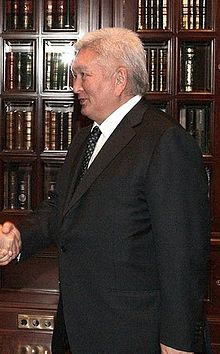Felix Kulov
| Felix Kulov Феликс Кулов |
|
|---|---|
 |
|
| Prime Minister of Kyrgyzstan | |
|
In office 15 August 2005 – 29 January 2007 Acting: 15 August 2005 – 1 September 2005 |
|
| President | Kurmanbek Bakiyev |
| Preceded by | Kurmanbek Bakiyev |
| Succeeded by | Azim Isabekov |
| Vice President of Kyrgyzstan | |
|
In office 27 February 1992 – 10 December 1993 |
|
| President | Askar Akayev |
| Preceded by | German Kuznetsov |
| Succeeded by | Position abolished |
| Personal details | |
| Born |
10 October 1948 Frunze, Soviet Union (now Bishkek, Kyrgyzstan) |
| Political party | Ar-Namys |
| Spouse(s) | Naila Mamakanovna Bayaliev |
| Religion | Sunni Islam |
Felix Sharshenbayevich Kulov (Russian/Kyrgyz: Феликс Шаршенбаевич Кулов - variously transliterated; born 29 October 1948) is a Kyrgyz politician who was Prime Minister of Kyrgyzstan from 2005 to 2007, following the Tulip Revolution. He first served from 1 September 2005 until he resigned on 19 December 2006.President Kurmanbek Bakiyev reappointed him acting Prime Minister the same day, but parliamentary opposition meant Bakiyev's attempts to renominate Kulov in January 2007 were unsuccessful and on 29 January the assembly's members approved a replacement. Kulov cofounded and leads Ar-Namys, a political party, and chairs the People's Congress, an electoral alliance to which Ar-Namys belongs.
Kulov was born in Frunze (present-day Bishkek), and initially trained as a policeman. Between 1978 and 1998 he held various posts in the Kyrgyz government, including Minister of the Interior, Minister for National Security and Governor of Chuy Province. From 1992–1993 he was Vice President, in which position he oversaw the launch of the Kyrgyz currency, the Som. However, he was forced to resign following a scandal over missing gold reserves.
From 1998 to 1999 Kulov served as Mayor of Bishkek, becoming a popular politician in the city. In 1999 he participated in the formation of Ar-Namys, becoming its first leader. In February 2000 he announced his intention to run as a member of the Supreme Council. Kyrgyz police arrested him a month later for corruption. On 22 January 2001 a military court found him guilty and sentenced him to seven years in prison. He was cleared of all charges against him in 2005, and in 2010, the UN Human Rights Committee found several civil rights violations in his detention and trial.
...
Wikipedia
